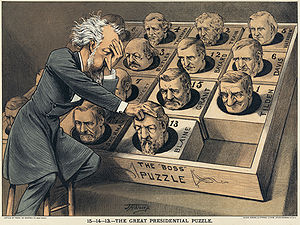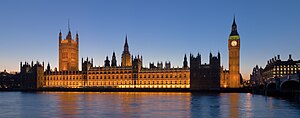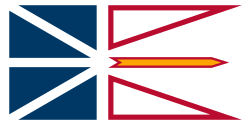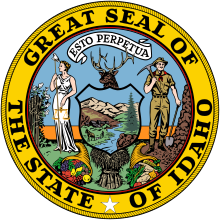Portal:Politics
| Main | Topics and categories | Tasks and projects |
The Politics portal
Politics (from Ancient Greek πολιτικά (politiká) 'affairs of the cities') is the set of activities that are associated with making decisions in groups, or other forms of power relations among individuals, such as the distribution of resources or status. The branch of social science that studies politics and government is referred to as political science.
It may be used positively in the context of a "political solution" which is compromising and non-violent, or descriptively as "the art or science of government", but also often carries a negative connotation. The concept has been defined in various ways, and different approaches have fundamentally differing views on whether it should be used extensively or in a limited way, empirically or normatively, and on whether conflict or co-operation is more essential to it.
A variety of methods are deployed in politics, which include promoting one's own political views among people, negotiation with other political subjects, making laws, and exercising internal and external force, including warfare against adversaries. Politics is exercised on a wide range of social levels, from clans and tribes of traditional societies, through modern local governments, companies and institutions up to sovereign states, to the international level.
In modern nation states, people often form political parties to represent their ideas. Members of a party often agree to take the same position on many issues and agree to support the same changes to law and the same leaders. An election is usually a competition between different parties.
A political system is a framework which defines acceptable political methods within a society. The history of political thought can be traced back to early antiquity, with seminal works such as Plato's Republic, Aristotle's Politics, Confucius's political manuscripts and Chanakya's Arthashastra. (Full article...)
Selected article
The League of Nations was an international organization founded after the First World War at the Paris Peace Conference in 1919. The League's goals included disarmament; preventing war through collective security; settling disputes between countries through negotiation and diplomacy; and improving global welfare. The League was a government of governments, with the role of settling disputes between individual nations in an open and legalist forum. The League lacked an armed force of its own and so depended on the Great Powers to enforce its resolutions, which they were often very reluctant to do. The League ultimately proved incapable of preventing aggression by the fascist powers in 1930s. The onset of the Second World War made it clear that the League had failed in its primary purpose—to avoid any future world war. The United Nations effectively replaced it after World War II and inherited a number of agencies and organisations founded by the League.
Featured picture

An 1880 political cartoon depicts Senator Roscoe Conkling over a "presidential puzzle" consisting of some of the potential Republican nominees as pieces of a newly invented sliding puzzle. Conkling held significant influence over the party during the 1880 Republican National Convention and attempted to use that to nominate Ulysses S. Grant, only to lose out to "dark horse" candidate James A. Garfield.
Within Rhode Island, Washington County is colloquially referred to as South County. (Full article...)
In Australian federal politics, the Leader of the Opposition is an elected member of parliament (MP) in the Australian House of Representatives who leads the opposition. The Leader of the Opposition, by convention, is the leader of the largest political party in the House of Representatives that is not in government.
When in parliament, the opposition leader sits on the left-hand side of the centre table, in front of the opposition and opposite the prime minister. The opposition leader is elected by his or her party according to its rules. A new leader of the opposition may be elected when the incumbent dies, resigns, or is challenged for the leadership. (Full article...)

This is a list of people who have addressed both Houses of the United Kingdom Parliament at the same time. Although English and later British monarchs have jointly addressed the House of Commons and the House of Lords on several occasions since the 16th century, the first foreign dignitary to do so was French President Albert Lebrun in March 1939. The list excludes the speeches given by (or on behalf of) the Sovereign at the State Opening of Parliament and at the close of each parliamentary session.
Only four people besides the reigning monarch at the time have addressed both Houses together on more than one occasion. Nelson Mandela addressed Members of the Commons and the Lords in 1993 and in 1996 as President of South Africa. Mikhail Gorbachev addressed the Houses as a secretary of the Communist Party of the Soviet Union and a foreign delegate of the Soviet Union in 1984 and again, in 1993, on behalf of the Inter-Parliamentary Union. Shimon Peres addressed the Houses as Prime Minister of Israel in 1986 and as President in 2008. Volodymyr Zelenskyy addressed the Houses as President of Ukraine, the first to address in the Chamber (albeit via remote video link from Ukraine), in 2022 during the war in Ukraine. (Full article...)
Unlike the other 49 states, Hawaii does not delegate educational responsibility to local school boards; public education is carried out by the Hawaii State Department of Education. Hawaiian counties collect property taxes and user fees in order to support road maintenance, community activities, parks (including life guards at beach parks), garbage collection, police (the state police force, called the Hawaii Department of Public Safety, is limited in scope), ambulance, and fire suppression services. (Full article...)
The governor of Idaho is the head of government of Idaho and commander-in-chief of the state's military forces. The officeholder has the duty to see state laws are executed, power to either approve or veto bills passed by the Idaho Legislature. The current governor of Idaho is Brad Little, a Republican, who took office on January 7, 2019.
Thirty-one individuals have held the office of governor of Idaho since the state's admission to the Union in 1890, two of whom served non-consecutive terms. The state's first governor, George L. Shoup, had the shortest term, of three months; Cecil Andrus had the longest, of 14 years. (Full article...)

The premier of Newfoundland and Labrador is current title of the first minister for the Canadian province of Newfoundland and Labrador, which was at certain points in its history a colony, dominion, and province. The province had a system of responsible government from 1855 to 1934, and again since 1949. Newfoundland became a British crown colony in 1855, in 1907 it became a dominion, and in 1949, it became a province and joined Canadian Confederation. Since then, the province has been a part of the Canadian federation and has kept its own legislature to deal with provincial matters. The province was named Newfoundland and Labrador on April 1, 1949 .
The province has a unicameral Westminster-style parliamentary government, in which the premier is the leader of the party that controls the most seats in the House of Assembly. The premier is Newfoundland and Labrador's head of government, and the king of Canada is its head of state and is represented by the lieutenant governor of Newfoundland and Labrador. The premier picks a cabinet from the elected members to form the Executive Council of Newfoundland and Labrador, and presides over that body. Members are first elected to the House during general elections. General elections must be conducted every four years from the date of the last election. An election may also take place if the governing party loses the confidence of the legislature by the defeat of a supply bill or tabling of a confidence motion. (Full article...)

France was ruled by monarchs from the establishment of the Kingdom of West Francia in 843 until the end of the Second French Empire in 1870, with several interruptions.
Classical French historiography usually regards Clovis I, king of the Franks (r. 507–511), as the first king of France. However, historians today consider that such a kingdom did not begin until the establishment of West Francia, during the dissolution of the Carolingian Empire in the 800s. (Full article...)
Selected quote
Selected biography
Harry Jheopart Capehart Sr. (May 2, 1881 – May 15, 1955) was an American lawyer, politician, and businessperson in the U.S. state of West Virginia. Capehart served as a member of the West Virginia House of Delegates, representing McDowell County for three consecutive terms, from 1919 to 1925. He also served as an assessor, city councilperson, and city attorney for Keystone, West Virginia.
Did you know (auto-generated) -

- ... that before entering politics, Romina Pérez worked at the Center for Legal Studies and Social Research, which "became a 'nursery' for intellectual and political cadres of the Movement for Socialism"?
- ... that Dante used the third circle of hell to discuss contemporary Florentine politics rather than the sin of gluttony?
- ... that Liz Shore's nomination to be Chief Medical Officer of the United Kingdom was vetoed by Margaret Thatcher because of Shore's husband's political affiliation?
- ... that one of the arguments made by the Simla Deputation for increasing Muslim representation in Indian politics was that they had ruled India under the Mughal Empire?
- ... that Olga Onuch is believed to be the first professor of Ukrainian politics in the English-speaking world?
- ... that Liu Yu has been called "one of China's best-known America-watchers" and "China's de Tocqueville"?
More did you know...
- ...that the Voting Rights Act of 1965 banned literacy tests as a voting qualification in the U.S.?
- ...that politicians discuss the ways in which they and their families have suffered because of Oprahization?
- ...that Democratic and Republican plans for the 2012 United States federal budget both focus on deficit reduction, but differ in their changes to taxation, entitlement programs, and research funding?
- ...that Conservative Party candidate Bernard Trottier won a seat in the 41st Canadian Parliament by defeating the incumbent Leader of the Liberal Party of Canada in the 2011 federal election?
- ...that the Brown Dog affair, an Edwardian era vivisection controversy, led to massive riots?
- ...that on the death of Governor George Madison, Kentucky lieutenant governor Gabriel Slaughter was refused the title of "governor" by a hostile state legislature and was referred to as "acting governor" for the duration of his three-year administration?
In this month
- May 5, 2005 – A General Election in the United Kingdom sees Tony Blair's Labour government returned to office with a reduced majority of 66.
- May 14, 1948 – The Declaration of Independence of Israel is made.
- May 18, 1948 – The first Legislative Yuan of the Republic of China officially convenes in Nanking.
News and Current events
- August 11: 4 local government areas in New South Wales, Australia locked down after COVID-19 case
- August 11: Australia: AstraZeneca vaccine access expanded by Victorian government
- August 1: Australia: Victorian lockdown lifted
- July 29: Tunisia's president dismisses prime minister, suspends parliament
- July 25: Australia: Wikinews interviews Reg Kidd, mayor of the City of Orange, about COVID-19 lockdown and local government
- July 23: South Australia enters week-long lockdown to contain COVID-19 Delta variant spread
- July 21: Technological University Dublin senior lecturer Dr Lorcan Sirr speaks to Wikinews on housing market in Ireland
- July 21: Three rural councils in New South Wales, Australia enter 7-day lockdown
- July 21: Australia: Victoria lockdown extended by a week with 85 active cases recorded
- July 15: California governor signs new state budget, eligible Californians to get stimulus payments
Topics and categories
General images
Related portals
Associated Wikimedia
The following Wikimedia Foundation sister projects provide more on this subject:
-
Commons
Free media repository -
Wikibooks
Free textbooks and manuals -
Wikidata
Free knowledge base -
Wikinews
Free-content news -
Wikiquote
Collection of quotations -
Wikisource
Free-content library -
Wikiversity
Free learning tools -
Wiktionary
Dictionary and thesaurus






















































